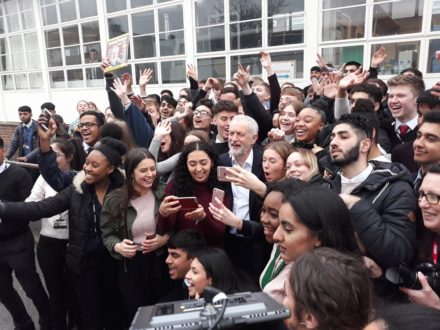
From 2021, 16- and 17-year-olds will have the right to vote in Welsh Assembly elections, bringing the voting age in Wales in line with Scotland, where in 2015 a bill was passed unanimously to extend voting rights to 16 year olds. This leaves England and Northern Ireland trailing behind. It’s high time for the whole of the United Kingdom to allow votes at 16.
There have always been strong arguments for lowering the voting age. 16-year-olds can get married, have children, join the army, and even pay taxes. The case in favour gained attention both in 2014, when 16-year-olds were allowed to vote in the Scottish independence referendum, and in 2016, when they were denied the vote in the EU referendum.
There is now another argument for extending suffrage to 16- and 17-year-olds, rarely addressed despite its growing pertinence: the fraying intergenerational contract. It is this contract that underpins our society. Generations of working age people pay in to support the elderly and the young, knowing in turn they have been and will be supported by others.
But for millennials and generation Z, it doesn’t feel like that. We have watched successive governments strip away the benefits young people once enjoyed so that the state can give more to those who had these benefits in their youth. We have seen political decisions, such as leaving the European Union, taken and carried out to please older generations, while being left with the fall-out and the accompanying resentment and scepticism.
One of the key reasons those in power made these decisions is because of the sheer size, and therefore voting weight, of the baby boomer generation. Political parties have focused so much on catering for this generation to gain power that they have neglected others.
It’s only by introducing votes at 16 that we can redress this imbalance. Increasing the number of young people who can vote will help to equalise the voting weight between the young and old, forcing parties to consider millennials and generation Z when introducing policies.
This does not have to be at the expense of the elderly, and nor should it be. Expanding the size of the youth vote will encourage politicians to find solutions that do not disproportionately affect and alienate one generation in particular.
Of course, many opponents to lowering the voting age will repeat the same arguments they always have – namely that young people are not sufficiently engaged with politics or ready to decide who should run the country.
These arguments ignore that it was precisely by appealing to young people in the general election last year that Labour won the support of a significantly higher number of people aged 18-30. Besides, it is the duty of the government to ensure young people are given sufficient political education and awareness in school, and we should be ashamed that this does not already take place.
I could also argue this policy would be beneficial to political parties: the Tories won’t be able to rely on the elderly vote forever and must engage with youth, while as things stand Labour would likely increase its vote share with more young people voting.
But this is not about political parties: it’s the fight for universal suffrage. This is about a rebalancing of the intergenerational contract so we can continue to rely on it in the coming years. This is about young people finally having a say in their futures.
Imogen Tyreman is a Young Fabian member and contributor to A Nation Divided: Building a United Kingdom pamphlet.




More from LabourList
‘Labour won’t stop the far right by changing leaders — only by proving what the left can deliver’
‘Cutting Welsh university funding would be economic vandalism, not reform’
Sadiq Khan signals he will stand for a fourth term as London Mayor